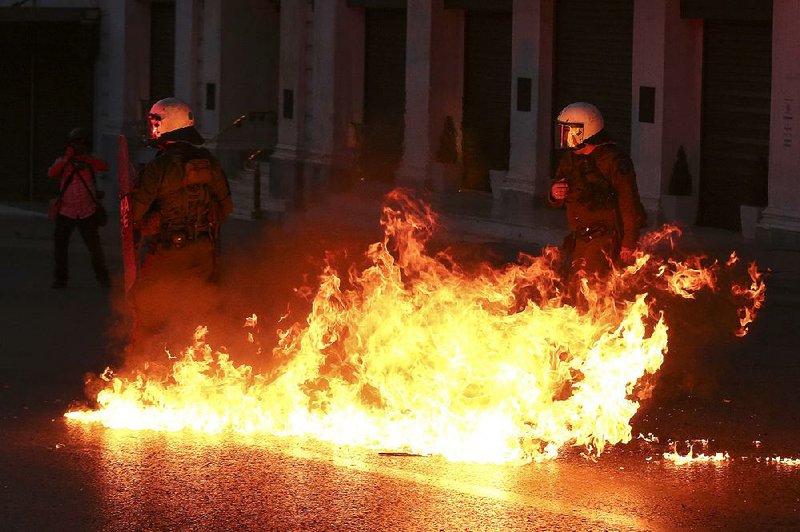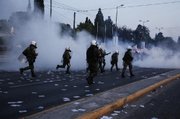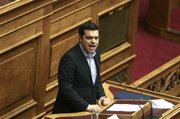ATHENS, Greece -- Greece's Parliament has approved a bill that overhauls the debt-ridden country's pension and tax systems.
The measure, introduced as part of requirements the country must meet under its third international bailout, is set to increase social security and pension contributions and raise taxes for most people.
The bill was approved by all 153 lawmakers of the ruling Syriza/Independent Greeks government coalition. All opposition parties in the 300-member Parliament voted against it.
The package, which includes cuts to retirement benefits while increasing income taxes, is meant to net $6.2 billion toward debt reduction, a condition demanded by international creditors for the country to receive its next aid tranche.
Eurozone finance ministers are to meet today to discuss negotiations with economically battered Greece.
Euro-area governments are reviewing whether to release the second installment of an 86 billion-euro bailout for Greece, six months after it was scheduled. A euro was equal to nearly $1.14 as of Sunday night.
As the delay weighs on the nation's ability to meet debt payments in July, the International Monetary Fund has said it would be open to disbursing a new loan that would be separate from the European bailout.
However, the fund has questioned Greece's ability to post a fiscal surplus before interest payments of 3.5 percent of gross domestic product within two years, as stipulated under the European program.
The finance ministers today will not only discuss the austerity measures attached to the latest review of Greece's bailout, but also possible debt-relief initiatives against the backdrop of persistent IMF demands for less ambitious fiscal targets to be set for Europe's most indebted state.
The euro area and the IMF will assess whether Greek Prime Minister Alexis Tsipras has made enough budget-tightening commitments to gain another aid disbursement. At issue is an IMF demand for fiscal "contingency measures" worth about $4 billion in case Greece strays off budgetary course.
Such a package, equal to 2 percent of Greece's gross domestic product, is politically thorny for a premier who promised voters he would oppose any extra austerity and who governs with a three-seat parliamentary majority. Should the IMF give the Greek government insufficient wiggle room at the meeting with euro-area finance ministers in Brussels, Tsipras could end up calling snap elections or a referendum -- both of which occurred last year when Greece came close to a euro exit.
"The nature of the contingency package could determine the government's fate, as it would be very difficult to secure the required parliamentary majority for detailed measures," Wolfango Piccoli, an analyst at Teneo Intelligence in London, said in a May 6 report. "The risk of snap polls could increase significantly if the lenders decide to play hardball."
Protest violence
In Athens, Sunday's vote took place amid a crippling general strike and protests that briefly turned violent Sunday. Greek anarchists hurled firebombs, chairs and wooden planks at riot police in brief clashes outside Parliament, disrupting a much larger, peaceful rally on Sunday.
Police responded with stun grenades and bursts of tear gas to disperse the anarchists who were split into two groups -- one of them mixed among the peaceful protest of about 20,000 people holding banners and the other inside Syntagma Square in front of Parliament.
Greek workers said the increases will decimate their incomes, already hurt by six years of austerity, and have staged a series of strikes.
One protester told Greek television that the legislation is "the gravestone of the retirement system as we know it."
The larger, peaceful rally Sunday had been called for by Greece's biggest unions, and most of those in attendance were Communist Party sympathizers. About 45 minutes before they started throwing projectiles, anarchists approached and beat up a known farmer activist, shouting that he was a member of the far-right Golden Dawn party. Other protesters dragged the farmer away.
A few minutes later, another group of anarchists set upon another person and riot police used stun grenades to stop the beating. The anarchists then regrouped before attacking riot police outside a trio of luxury hotels in Syntagma Square.
The police use of tear gas initially cleared the space outside the Parliament. But most of the peaceful protesters returned before finally dispersing for good before the vote on the pension and tax bill.
There were also clashes in Thessaloniki, when anarchists broke away from a protest march to hurl firebombs at police guarding the local offices of the ruling Syriza party. Police used tear gas and chased the rioters through the streets in central Thessaloniki.
Several professional associations, including engineers, journalists and doctors, had warned lawmakers that are also members of those associations that they will face disciplinary action and possible expulsion if they vote for the bill. Tsipras himself is a member of the engineers' association.
Information for this article was contributed by Demetris Nellas, Theodora Tongas and Costas Kantouris of The Associated Press; by staff members of Deutsche Presse-Agentur; and by Eleni Chrepa, Jonathan Stearns and Karl Stagno Navarra of Bloomberg News.
A Section on 05/09/2016


